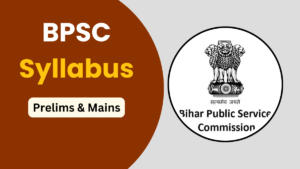Table of Contents
Management is an optional paper in the UPSC IAS Mains Exam, which consists of a total of nine papers. Concepts in the Management syllabus are useful in various professional fields beyond the IAS exam. Those with management degrees or expertise in management may find this subject beneficial as an elective. Management is a popular choice among the 48 optional subjects offered by UPSC. A detailed breakdown of the Management syllabus for the IAS Mains exam is provided below.
UPSC Management Syllabus 2025
The UPSC Management Syllabus 2025 for the UPSC Civil Services Exam covers key areas of management in the General Studies Paper of the Main Exam. The syllabus is prepared to assess candidates understanding of various management concepts and their applications.
Candidates need to understand these areas well, including management principles, HR practices, organizational culture, economic policies, strategic planning, and marketing principles. Aspirants should refer to the official UPSC syllabus and study materials to fully cover these topics and stay updated on current management trends.
UPSC Management Syllabus 2025
The Management subject in the UPSC Mains exam consists of two papers, each worth 250 marks, totaling 500 marks. Candidates must answer five out of the eight questions, including one mandatory question from the last three. Performing well in the Management papers can significantly boost an IAS candidate’s overall score in the UPSC Mains.
UPSC Management Mains Syllabus for Optional Paper 1
| Subject Area | Topics |
| 1. Managerial Function and Process |
– Concept and Foundations of Management
– Evolution of Management Thoughts
– Managerial Functions: Planning, Organizing, Controlling
– Decision making
– Role of Manager, Managerial skills
– Entrepreneurship
– Management of innovation
– Managing in a global environment – Flexible Systems Management
– Social responsibility and managerial ethics
– Process and customer orientation
– Managerial processes on direct and indirect value chain
|
| 2. Organizational Behavior and Design |
– Conceptual model of organization behaviour
– The individual processes: personality, values and attitude, perception, motivation, learning and reinforcement, work stress and stress management
– The dynamics of organization behaviour: power and politics, conflict and negotiation, leadership process and styles, communication
– The Organizational Processes: decision making, job design
– Classical, Neoclassical and Contingency approaches to organizational design
– Organizational theory and design: organizational culture, managing cultural diversity, learning organization; organizational change and development
– Knowledge-Based Enterprise: systems and processes; Networked and virtual organizations
|
| 3. Human Resource Management |
– HR challenges
– HRM functions
– The future challenges of HRM
– Strategic Management of human resources
– Human resource planning
– Job analysis
– Job evaluation
– Recruitment and selection
– Training and development
– Promotion and transfer
– Performance management
– Compensation management and benefits
– Employee morale and productivity
– Management of organizational climate and Industrial relations
– Human resources accounting and audit
– Human resource information system
– International human resource management
|
| 4. Accounting for Managers |
– Financial accounting: concept, importance and scope, generally accepted accounting principles, preparation of financial statements with special reference to the analysis of a balance sheet and measurement of business income, inventory valuation and depreciation, financial statement analysis, fund flow analysis, the statement of cash flows
– Management accounting: concept, need, importance and scope; Cost accounting: records and processes, cost ledger and control accounts, reconciliation and integration between financial and cost accounts; Overhead cost and control, Job and process costing, Budget and budgetary control, Performance budgeting, Zero-base budgeting, relevant costing and costing for decision-making, standard costing and variance analysis, marginal costing and absorption costing
|
| 5. Financial Management |
– Goals of the finance function
– Concepts of value and return
– Valuation of bonds and shares
– Management of working capital: Estimation and financing; Management of cash, receivables, inventory and current liabilities
– Cost of capital
– Capital budgeting
– Financial and operating leverage
– Design of capital structure: theories and practices
– Shareholder value creation: dividend policy, corporate financial policy and strategy, management of corporate distress and restructuring strategy
– Capital and money markets: institutions and instruments; Leasing, hire purchase and venture capital; Regulation of capital market
– Risk and return: portfolio theory; CAPM; APT; Financial derivatives: option, futures, swap; Recent reforms in financial sector
|
| 6. Marketing Management |
– Concept, evolution and scope
– Marketing strategy formulation and components of marketing plan
– Segmenting and targeting the market
– Positioning and differentiating the market offering
– Analyzing competition
– Analyzing consumer markets
– Industrial buyer behavior
– Market research
– Product strategy – Pricing strategies
– Designing and managing Marketing channels
– Integrated marketing communications
– Building customer satisfaction, Value and retention
– Services and non-profit marketing
– Ethics in marketing
– Consumer protection
– Internet Marketing
– Retail management
– Customer relationship management
– Concept of holistic marketing
|
UPSC Management Syllabus for Optional Paper 2
The UPSC Management Syllabus for Paper 2 assesses candidates’ understanding of management concepts and practices within the context of India’s economic and social environment. Key topics include: Managerial Economics, Financial Management, Marketing Management, Human Resource Management, Industrial Relations, Labor Laws, International Business, Current Trends in Management
Candidates should have a thorough understanding of these subjects and their relevance to the Indian context. The paper assesses candidates’ skills in analyzing and solving management issues, making informed decisions, and recognizing the challenges and opportunities in Indian management practices.
| Subject Area | Topics |
| 1. Quantitative Techniques in Decision Making |
– Descriptive statistics: tabular, graphical, and numerical methods; introduction to probability, discrete and continuous probability distributions; inferential statistics sampling distributions, central limit theorem; hypothesis testing for differences between means and proportions; inference about population variances; Chi-square and ANOVA; simple correlation and regression; time series and forecasting; decision theory; index numbers
– Linear programming: problem formulation, simplex method and graphical solution, sensitivity analysis
|
| 2. Production and Operations Management |
– Fundamentals of operations management; Organizing for production; Aggregate production planning, capacity planning, plant design: process planning, plant size and scale of operations, Management of facilities; Line balancing; Equipment replacement and maintenance; Production control; Supply chain management
– vendor evaluation and audit; Quality management; Statistical process control, Six Sigma; Flexibility and agility in manufacturing systems; World class manufacturing; Project management concepts, R&D management, Management of service operations; Role and importance of materials management, value analysis, make or buy decision; Inventory control, MRP; Waste management
|
| 3. Management Information System |
– Conceptual foundations of information systems; Information theory; Information resource management; Types of information systems; Systems development – Overview of systems and design; System development management life-cycle, Designing for online and distributed environments; Implementation and control of project; Trends in information technology; Managing data resource – Organizing data; DSS and RDBMS; Enterprise Resource Planning (ERP), Expert systems, e-Business architecture, e-Governance; Information systems planning, Flexibility in information systems; User involvement; Evaluation of information systems
|
| 4. Government Business Interface |
– State participation in business, Interaction between Government, Business and different Chambers of Commerce and Industry in India; Government’s policy with regard to Small Scale Industries; Government clearances for establishing a new enterprise; Public Distribution System; Government control over price and distribution; Consumer Protection Act (CPA) and The Role of voluntary organizations in protecting consumers’ rights; New Industrial Policy of the Government: liberalization, deregulation, and privatization; Indian planning system; Government policy concerning the development of Backward areas/regions; The Responsibilities of the business as well as the Government to protect the environment; Corporate Governance; Cyber Laws
|
| 5. Strategic Cost Management |
– Business policy as a field of study; Nature and scope of strategic management, Strategic intent, vision, objectives, and policies; Process of strategic planning and implementation; Environmental analysis and internal analysis; SWOT analysis; Tools and techniques for strategic analysis – Impact matrix: The experience curve, BCG matrix, GEC mode, Industry analysis, Concept of the value chain; Strategic profile of a firm; Framework for analyzing competition; Competitive advantage of a firm; Generic competitive strategies; Growth strategies – expansion, integration, and diversification; Concept of core competence, Strategic flexibility; Reinventing strategy; Strategy and structure; Chief Executive and Board; Turnaround management; Management of strategic change; Strategic alliances, Mergers, and Acquisitions; Strategy and corporate evolution in the Indian context
|
| 6. International Business |
– International Business Environment: Changing composition of trade in goods and services; India’s Foreign Trade: Policy and trends; Financing of International trade; Regional Economic Cooperation; FTAs; Internationalization of service firms; International production; Operation Management in International companies; International Taxation; Global competitiveness and technological developments; Global e-Business; Designing global organizational structure and control; Multicultural management; Global business strategy; Global marketing strategies; Export Management; Export- Import procedures; Joint Ventures; Foreign Investment: Foreign direct investment and foreign portfolio investment; Cross-border Mergers and Acquisitions; Foreign Exchange Risk Exposure Management; World Financial Markets and International Banking; External Debt Management; Country Risk Analysis
|
UPSC Management Optional Books
When it comes to preparing for the UPSC Management optional subject, several books can be referred to. Here are some recommended books:
- “Principles of Management” by Harold Koontz
- “Marketing Management” by Philip Kotler
- “Essentials of Organizational Behavior” by Stephen P. Robbins
- “Organizational Theory and Design” by Richard Daft
- “Principles of Corporate Finance” by Brealey Myers
- “No book required” for Accounting for Managers
- “Human Resource Management” by VSP Rao
- “Quantitative Approaches to Management” by Levin and Rubin
- “Management Information Systems” by either Laudon or O’Brien
- “Strategic Management” by Hill and Jones
- “International Business” by Hill and Jain
- “Operations Management” by Heizer and Render
- “Business Environment” by AC Fernando
| UPSC Mains Optional Papers Related Articles | |
| UPSC History Syllabus | UPSC Public Administration Syllabus |
| UPSC Chemistry Syllabus | UPSC Economics Syllabus |
| UPSC Geography Syllabus | UPSC Polity Syllabus |
| UPSC Physics Syllabus | UPSC Botany Syllabus |



 APSC Syllabus 2025, Download Prelims And...
APSC Syllabus 2025, Download Prelims And...
 Punjab PCS Syllabus 2025, New Prelims an...
Punjab PCS Syllabus 2025, New Prelims an...
 BPSC Syllabus 2025 and Exam Pattern For ...
BPSC Syllabus 2025 and Exam Pattern For ...




